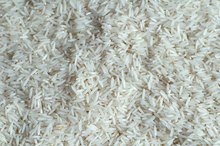What does fact checked mean?
At Healthfully, we strive to deliver objective content that is accurate and up-to-date. Our team periodically reviews articles in order to ensure content quality. The sources cited below consist of evidence from peer-reviewed journals, prominent medical organizations, academic associations, and government data.
- "Journal of the Medical Association of Thailand"; Effect of Chili Pepper (Capsicum Frutescens) Ingestion on Plasma Glucose Response and Metabolic Rate in Thai Women; P. Chaiyata, et al.; September 2003
- "Journal of the Medical Association of Thailand"; Effect of Chili Pepper (Capsicum Frutescens) Ingestion on Plasma Glucose Response and Metabolic Rate in Thai Women; P. Chaiyata, et al.; September 2003
- "European Journal of Clinical Nutrition"; The Effect of 4-Week Chilli Supplementation on Metabolic and Arterial Function in Humans; K.D. Ahuja, et al.; March 2007
- "European Journal of Clinical Nutrition"; The Effect of 4-Week Chilli Supplementation on Metabolic and Arterial Function in Humans; K.D. Ahuja, et al.; March 2007
The information contained on this site is for informational purposes only, and should not be used as a substitute for the advice of a professional health care provider. Please check with the appropriate physician regarding health questions and concerns. Although we strive to deliver accurate and up-to-date information, no guarantee to that effect is made.
Cayenne Pepper and Blood Sugar
Consuming cayenne pepper or chili pepper, as it is also known, results in a burning sensation that increases your body temperature. This effect is due to the capsaicin compound. Although cayenne pepper is associated with several benefits, including boosting your metabolism, its ability to reduce blood sugar has shown mixed results.
Blood Sugar
The body’s cells needs glucose to make energy and perform metabolic activities. However, excess blood sugar, or blood glucose, can impair blood vessel function and decrease blood flow to your organs. Over time, this can lead to organ damage and disease. The body regulates blood sugar and tries to keep it between 70 and 110 mg/dL, according to MayoClinic.com. Possible causes of high blood sugar levels include eating too many carbs, stress, insufficient insulin production and medications.
- The body’s cells needs glucose to make energy and perform metabolic activities.
- However, excess blood sugar, or blood glucose, can impair blood vessel function and decrease blood flow to your organs.
Lowers Blood Sugar
Do Cayenne, Caffeine & Green Tea Stimulate Weight Loss
Learn More
Scientists at Mahidol University in Thailand investigated the effects of chili pepper on plasma glucose levels and metabolic rate in healthy Thai women 1. Subjects were assigned a glucose drink with or without 5 grams of chili pepper. Scientists observed that those in the chili pepper group had significantly lower blood glucose levels 30 minutes after ingestion compared with those who didn’t have chili pepper. The findings were reported in the September 2003 issue of "Journal of the Medical Association of Thailand. 1”
No Effect
Researchers at the University of Tasmania in Australia examined the impact of chili supplementation on metabolic parameters, such as blood glucose, in men and women. Subjects adhered to a diet with 30 g of chili pepper blend with their normal diet or a chili-free diet for four weeks. At the end of the study, which was published in the March 2007 issue of the “European Journal of Clinical Nutrition,” scientists observed that those in the chili pepper group experienced no changes in blood glucose levels compared with those who followed the chili-free diet.
Interactions
Cortisol & Carbohydrates
Learn More
Cayenne pepper’s heat effects may cause nausea, upset stomach and bloating, according to the University of Maryland Medical Center. Consult your health care provider before consuming cayenne pepper, particularly if you’re taking medication.
Related Articles
References
- "Journal of the Medical Association of Thailand"; Effect of Chili Pepper (Capsicum Frutescens) Ingestion on Plasma Glucose Response and Metabolic Rate in Thai Women; P. Chaiyata, et al.; September 2003
- "European Journal of Clinical Nutrition"; The Effect of 4-Week Chilli Supplementation on Metabolic and Arterial Function in Humans; K.D. Ahuja, et al.; March 2007
- University of Rochester Medical Center, Health Encyclopedia: Cayenne
- Harvard Medical School, Harvard Women's Health Watch, "The dubious practice of detox." May 2008
- Reinbach HC, Smeets A, Martinussen T, Møller P, Westerterp-plantenga MS. Effects of capsaicin, green tea and CH-19 sweet pepper on appetite and energy intake in humans in negative and positive energy balance. Clin Nutr. 2009;28(3):260-5. DOI:10.1016/j.clnu.2009.01.010
- National Institutes of Health, Office of Dietary Supplements, "Dietary Supplements for Weight Loss, Fact Sheet for Health Professionals."
- Esmaillzadeh A, Keshteli AH, Hajishafiee M, Feizi A, Feinle-bisset C, Adibi P. Consumption of spicy foods and the prevalence of irritable bowel syndrome. World J Gastroenterol. 2013;19(38):6465-71. DOI:10.3748/wjg.v19.i38.6465
- Gagnier JJ, van Tulder M, Berman B, Bombardier C. Herbal medicine for low back pain. Cochrane Database Syst Rev. 2006 Apr 19;(2):CD004504.
- McCarty MF, DiNicolantonio JJ, O'Keefe JH. Capsaicin may have important potential for promoting vascular and metabolic health. Open Heart. 2015 Jun 17;2(1):e000262.
- Kim CS, Kawada T, Kim BS, et al. Capsaicin exhibits anti-inflammatory property by inhibiting IkB-a degradation in LPS-stimulated peritoneal macrophages. Cell Signal. 2003 Mar;15(3):299-306.
- Laslett LL, Jones G. Capsaicin for osteoarthritis pain. Prog Drug Res. 2014;68:277-91.
- Leung FW. Capsaicin as an anti-obesity drug. Prog Drug Res. 2014;68:171-9.
Writer Bio
Brandon Dotson is a graduate of Lehman college with a Bachelor of Science in health education and a minor in marketing. He has been a writer for over five years and plans on pursuing a master's degree in marketing.








